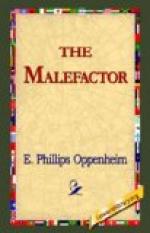She wore a plain white cambric dress and a simple, but much beflowered hat; the smaller details of her toilet all indicated the correct taste and instinctive coquetry of her French descent. And she was beautiful! Wingrave regarded her critically and realized, perhaps for the first time, how beautiful. Her eyes were large and clear, and her eyebrows delicately defined. Her mouth, with its slightly humorous curl, was a little large, but wholly delightful. The sun of the last few weeks had given to her skin a faint, but most becoming, duskiness. Under his close scrutiny, a flush of color stole into her cheeks. She laughed not altogether naturally.
“You look at me,” she said, “as though I were someone strange!”
“I was looking,” he answered, “for the child, the little black-frocked child, you know, with the hair down her back, and the tearful eyes. I don’t think I realized that she had vanished so completely.”
“Not more completely,” she declared gaily, “than the gloomy gentleman who frowned upon my existence and resented even my gratitude. Although,” she added, leaning a little towards him, “I am very much afraid that I see some signs of a relapse today. Don’t bother about those horrid letters. Let me tell Mrs. Tresfarwin to pack us up some lunch, and take me to Hanging Tor, please!”
Wingrave laughed a little unsteadily as he rose to his feet. One day more, then! Why not? The end would be soon enough! . . .
Sooner, perhaps, than even he imagined, for that night Aynesworth came, pale and travel-stained, with all the volcanic evidences of a great passion blazing in his eyes, quivering in his tone. The day had passed to Wingrave as a dream, more beautiful even than any in the roll of its predecessors. They sat together on low chairs upon the moonlit lawn, in their ears the murmur of the sea; upon their faces, gathering strength with the darkness, the night wind, salt and fragrant with all the sweetness of dying flowers. Wingrave had never realized more completely what still seemed to him this wonderful gap in his life. Behind it all, he had a subconsciousness that he was but taking a part in some mystical play; yet with an abandon which, when he stopped to think of it, astonished him, he gave himself up without effort or scruple to this most amazing interlude. All day he had talked more than ever before; the flush on his cheeks was like the flush of wine or the sun which had fired his blood. As he had talked the more, so had she grown the more silent. She was sitting now with her hands clasped and her head thrown back, looking up at the stars with unseeing eyes.
“You do not regret Normandy, then?” he asked.
“No!” she murmured. “I have been happy here. I have been happier than I could ever have been in Normandy.”
He turned and looked at her with curious intentness.
“My experience,” he said thoughtfully, “of young ladies of your age is somewhat limited. But I should have thought that you would have found it—lonely.”




